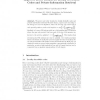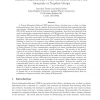219 search results - page 4 / 44 » Nearly Private Information Retrieval |
ESORICS
2009
Springer
14 years 2 months ago
2009
Springer
Abstract. The ubiquity of smartphones and other location-aware handheld devices has resulted in a dramatic increase in popularity of locationbased services (LBS) tailored to user l...
ICALP
2005
Springer
14 years 1 months ago
2005
Springer
We prove new lower bounds for locally decodable codes and private information retrieval. We show that a 2-query LDC encoding nbit strings over an ℓ-bit alphabet, where the decode...
ISW
2010
Springer
13 years 5 months ago
2010
Springer
A Private Information Retrieval (PIR) protocol allows a database user, or client, to obtain information from a data- base in a manner that prevents the database from knowing which...
SP
2007
IEEE
14 years 1 months ago
2007
IEEE
Since 1995, much work has been done creating protocols for private information retrieval (PIR). Many variants of the basic PIR model have been proposed, including such modificati...
ECCC
2006
13 years 7 months ago
2006
A q query Locally Decodable Code (LDC) encodes an n-bit message x as an N-bit codeword C(x), such that one can probabilistically recover any bit xi of the message by querying only...


